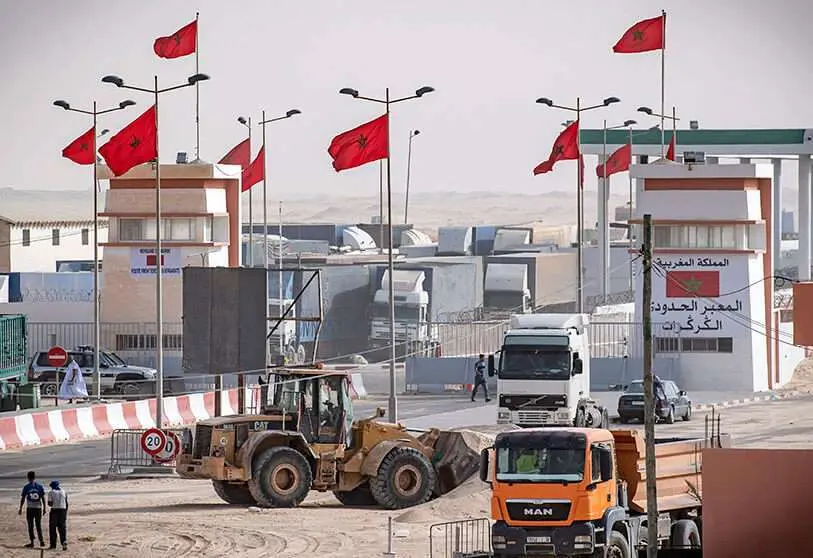Tensión en el Sáhara Occidental: origen e implicaciones para España

In the Canary Islands and on the Spanish mainland, the issue has aroused strong reactions, particularly in terms of solidarity with Saharan independence aspirations. What is the link that unites us to this territory? What are the geopolitical and security implications that we should take into account if the situation deteriorates?
Let's start with the first question. The Sahara was a Spanish colony until 1975. Proof of this are the memories of people of a certain age about the terror caused in young people by doing their military service there and the images of legionnaires in Land Rovers wearing turbans and sandals. Administratively, the Sahara was not a colony, but another province of Spain.
The origin of the current tension began in 1975. That year - while Franco was dying - Morocco - which claims the Sahara for itself - invaded the province in the famous Green March. The conflict was resolved with the Madrid Agreements, whereby Spain undertook to leave the Sahara and administer it temporarily with Morocco and Mauritania. However, things did not go as planned: Spain left a year later, a situation which Rabat and Nouakchott took advantage of to occupy the Sahara. The Polisario Front, which had fought against Spain, now found itself facing Morocco and Mauritania.
Although Mauritania withdrew in 1979, the war between Polisario and Morocco dragged on until 1991, when both sides agreed on a ceasefire and the establishment of the United Nations MINURSO, which was responsible for monitoring the ceasefire and drawing up a referendum. The referendum has not taken place and the conflict has become entrenched, reaching such a point of irrelevance that the word referendum no longer appears in UN communiqués and no Special Representative has been appointed since 2019.
A worsening of the conflict should concern us, especially from the migratory and antiterrorist angle.

If Morocco decides to declare war on Polisario (so far, only Polisario is at war), the conflict would have the potential to worsen the migratory crisis that the Canary Islands have been suffering for some months now. So far this year, 18,000 migrants have arrived on the Canary Islands' coasts, most of them from Morocco and leaving the coasts of the territory in dispute. If there were a war, it is very likely that many young Moroccans, with few opportunities for work, would not want to fight, especially if we consider that in Morocco compulsory military service affects males between 19 and 25. To this flow should be added that of the Saharawis who would escape both the conflict and the repression of Morocco, as Rabat will not tolerate any manifestation of sympathy for the Polisario in what it considers its southern provinces.
Another risk relates to terrorism. The Western Sahara borders on the Sahel, which has become a Jihadist powder keg in recent years. To complicate matters, the leader of the Islamic state of the Sahel, Adnan Abu al-Walid al-Sahrawi, is of Saharan origin, more specifically from the Tindouf camp, the main refugee camp of Polisario. Indeed, Jihadism would find fertile ground for recruiting in the Saharan camps as frustration has grown in recent years over the entrenchment of the conflict, the authoritarianism of the Polisario leadership and the miserable living conditions in the refugee camps. As a result, a war that in principle has no connection with Jihadism could be hijacked by the EIGS (Islamic State of the Great Sahara), as occurred in Mali in 2012, when the Tuareg insurrection was taken over by the Jihadists.
It is also necessary to consider a possibility which, although unpleasant, could involve Spain in the conflict: the possibility that Spain (especially the Canary Islands) could become the theatre of operations for terrorist acts on the Saharan side. Although it is true that the Canary Islands are sympathetic to Polisario, it is also unquestionable that they have a large Moroccan community. This may lead certain Saharawis-especially Jihadists-to organise attacks against Moroccan interests on the islands or against tourist facilities in retaliation for Spanish support for Morocco. The impact on tourism would be serious, particularly on the Canary Islands' reputation as a safe destination, which would further weaken the islands' economy. It would also increase local rejection of immigrants. Although the Canarian people have a reputation for solidarity, popular dissatisfaction with the migration crisis has also increased, all the more so as the pandemic has weakened the islands' main economic engine (tourism), on which many families depend.
In conclusion, the colonial link, Morocco's Green March and Spain's subsequent withdrawal, together with the invasion of Western Sahara by Morocco and Mauritania and the war with Rabat until 1991, are the origins of the current Saharan conflict. For Spain, a worsening of the situation would lead to an increase in the migration of Moroccans and Saharawis to the Canary Islands, worsening the current migratory crisis in the archipelago. In terms of security, the shadow of Jihadism, particularly the EIGS, may hang over Polisario, where conditions are fertile for radicalisation. If Jihadism prevails, Spain could be the victim of a terrorist campaign against tourist facilities and Moroccan interests, with the Canary Islands being the worst affected and having a negative impact on the archipelago's tourist reputation.









